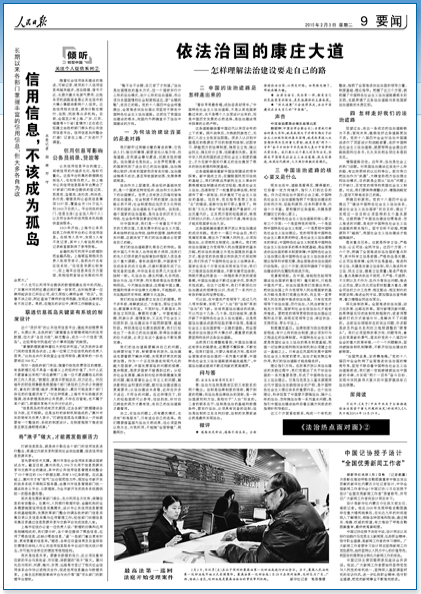In today’s edition of the People’s Daily, Party elites continue to make their case that the building of “rule of law” in China — the topic of last fall’s Fourth Plenum — must happen on China’s terms. China cannot and must not, according to this argument, slavishly copy the systems of the West. Such copying is a means proposed by unspecified “hostile forces” who hope to upset the “leadership of the Chinese Communist Party.”
Says the quote at the outset of the piece, which, in fact, could be equally understood as encouragement to first try “Western” systems of rule of law: “Only when you try it on for yourself do you know if a shoe fits.”
The following are selected passages in translation from today’s page-nine piece in the People’s Daily. [Homepage Image: “Ruby Red Slippers” from Chris Evans, available at Flickr.com under Creative Commons license]
“The Healthy Road of Ruling the Nation in Accord with the Law: How We Should Understand Going Our Own Road in Building Rule of Law”
People’s Daily
February 3, 2015
“Only when you try it on for yourself do you know if a shoe fits.” Rule of law is a basic method for governing a nation, but as for what rule of law mode a country puts into effect, and what rule of law path it takes, this must be a matter of what suits that country’s national conditions (国情) and social system. [A country] must “wear shoes that fit,” and it must travel its own road.
. . .
As for China, we are an ancient civilization with a history of 5,000 years, and we are also a socialist great nation (社会主义大国) under development. We have our own special rule of law traditions, our own special national conditions, our own special problems, and these determine that we must travel our own path in building rule of law.
Our rule of law path must be rooted in our own traditions. Although China’s autocratic traditions over thousands of years run deep, our forefathers began very early to explore the question of how to control human beings (驾驭人类自身). In the Spring and Autumn Period and the Warring States Period, China already had its own system and its own written code of law. In the Han and Tang dynasties a rather complete code of law emerged, and China’s legal system became its own unique school among a handful of legal systems in the world. . . In carrying out the building of rule of law today, we must take our roots in Chinese soil, mining out and passing along the essence of Chinese legal culture (中华法律文化精华). . .
Our rule of law path must be based on our own national conditions . . .
In summary, on political questions, there is no such thing as the best model or the “standard version” — there is only the choice that best suits oneself. We must borrow from the best fruits of rule of law culture overseas, but we must maintain ourselves and utility for us as the principal issue. We cannot pursue “full transplantation” (全面移植), copying [the systems of others].
. . .
After the Opium War, in order to save the people from destruction, many people with high-minded ideals advocated political reform. Many people recognized that the root of China’s backwardness was its old [political and social] systems. They sought to study and transplant (移植) the legal systems of the West, attempting constitutional monarchy, parliamentary democracy or “separation of the five powers” (五权分立) — all of these attempts failing. Only with the founding of the People’s Republic of China and the building of the socialist system were the political conditions in place and the systemic foundation laid for the true implementation of rule of law in the New China.
. . .
After the founding of the New China, on the foundations of the destruction of the old legal system of Republican China, we actively used our successful experiences from the base areas of the new democratic revolution, promoting socialist rule of law, quickly promulgating a series of important laws and regulations, including the first Constitution. . . Later, however, “leftist” errors occurred in the Party’s guiding ideology, and the legal system gradually lost priority. In particular, the “Cultural Revolution” led to serious destruction of the legal system, with grave prices paid. Our positive and negative experiences have led us to recognize: the method of rule of man (人治) is not the way forward, and only with rule of law can the country achieve long-term peace and stability.
. . .
I can be said that under the leadership of the Chinese Communist Party, through generations of hard exploration, [we have] realized the transition from “rule of man” to a “legal system,” and again a leap to “rule of law.” In summing up our nation’s accomplishments in terms of rule of law, we could list out more than a dozen, even scores, but what they come down to is that we have opened the road to socialist rule of law with Chinese characteristics (中国特色社会主义法治道路).
. . .
[From question: “How can we travel our rule of law road well?”]
By increasing our confidence in our road. In recent years, rule of law has been a hot topic in society. There is a debate as to what kind of road rule of law construction should take in our country. Hostile forces (敌对势力) take rule of law as their own “weapon,” hyping Western rule of law concepts and rule of law models, their objective being to use “rule of law” as an opening to deny the leadership of the Chinese Communist Party and our country’s socialist system. We must be clearly alert to this, increasing our strategic force and resolutely taking our own road.























